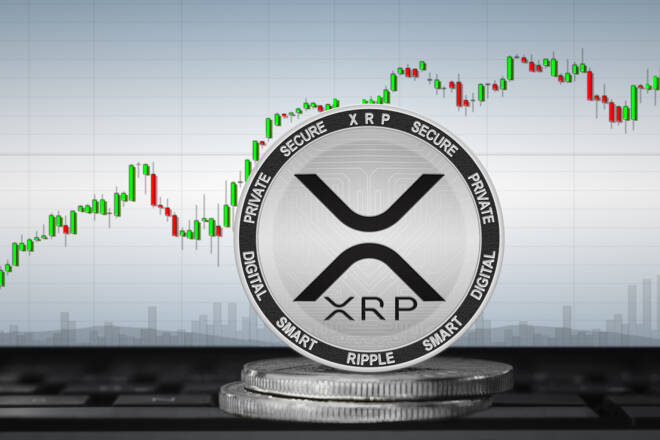Advertisement
Advertisement
XRP Bears Target $0.3650 on SEC v Ripple Silence and Fed Fear
By:
XRP found early support today. However, a lack of updates from the SEC v Ripple case will leave the SEC and Fed Fear to influence investor sentiment.
Key Insights:
- On Sunday, XRP fell by 2.29% to end the day at $0.37492.
- Bearish sentiment from the broader crypto market left XRP at sub-$0.38, with no SEC v Ripple updates to distract investors.
- The technical indicators are bearish, with XRP sitting below the 200-day EMA, signaling a return to sub-$0.37.
On Sunday, XRP fell by 2.29%. Reversing a 0.40% gain from Saturday, XRP ended the week down 5.93% to $0.37492. XRP ended the session at sub-$0.38 for the first time since January 18.
After a range-bound morning session, XRP rose to a late afternoon high of $0.38489 before hitting the reverse. Coming within range of the First Major Resistance Level (R1) at $0.3852, XRP slid to a late low of $0.37219. XRP fell through the day’s Major Support Levels before a move back through the Third Major Support Level (S3) at $0.3745 to end the day at $0.37492.
SEC v Ripple Case Takes a Backseat as Fed Fear and SEC Angst Linger
It was a quiet Sunday session, with no crypto events to provide XRP with direction. A lack of updates from the ongoing SEC v Ripple case left XRP in the hands of the broader crypto market.
Fed Fear continued to test buyer appetite. Since the release of the US Jobs Report on Friday, February 3, XRP has enjoyed only three bullish sessions from nine. The threat of a more hawkish Fed and a peak interest rate above 5% has weighed on the crypto market.
Increased regulatory risk has added to the bearish mood. News of Kraken settling with the SEC by ceasing US staking services and the threat of a US ban on crypto staking shook investor sentiment.
With the SEC turning the screw on the US digital asset space, the outcome of the SEC v Ripple case has become market critical. An SEC victory would allow Gary Gensler and the team to continue regulating by enforcement. However, a Ripple victory could force lawmakers to reconsider the SEC’s role in regulating the digital asset space.
The Day Ahead
It could be a choppy day ahead as investors consider Fed monetary policy and increasing US regulatory risk. News of the SEC targeting other crypto platforms for crypto staking would weigh on the broader crypto market.
Fed Fear will also test buyer appetite as investors wait for tomorrow’s US CPI Report, which will likely dictate whether the hawks have control. Hotter-than-expected inflation would support an interest rate peak above 5%, a bearish scenario for riskier assets.
However, investors should monitor the crypto wires for SEC v Ripple updates. FTX, Genesis, and Silvergate Bank news also need consideration.
XRP Price Action
At the time of writing, XRP was up 0.78% to $0.37786. A mixed start to the day saw XRP fall to an early low of $0.37428 before rising to a high of $0.37788.
Technical Indicators
XRP needs to avoid a fall through the $0.3773 pivot to target the First Major Resistance Level (R1) at $0.3825 and the Sunday high of $0.38489. A return to $0.38 would signal a bullish session. However, the broader crypto market and SEC v Ripple chatter would need to support a breakout.
In the case of another extended rally, XRP would likely test the Second Major Resistance Level (R2) at $0.39. The Third Major Resistance Level (R3) sits at $0.4027.
A fall through the pivot would bring the First Major Support Level (S1) at $0.36998 into play. However, barring another extended broad-based crypto sell-off, XRP should avoid sub-$0.3650 levels and the Second Major Support Level (S2) at $0.3646. The Third Major Support Level (S3) sits at $0.3519.
The EMAs and the 4-hourly candlestick chart (below) sent a bearish signal.
At the time of writing, XRP sat below the 50-day EMA, currently at $0.39053. The 50-day EMA pulled back from the 200-day EMA, with the 100-day EMA narrowing to the 200-day EMA. The signals were bearish.
A bearish cross of the 100-day EMA ($0.39489) through the 200-day EMA ($0.39234) would support a slide through S1 ($0.3698) to bring S2 ($0.3646) into view. However, a move through R1 ($0.3825) would give the bulls a run at R2 ($0.39) and the 50-day EMA ($0.39053). A move through the 50-day EMA would send a bullish signal.
About the Author
Bob Masonauthor
With over 28 years of experience in the financial industry, Bob has worked with various global rating agencies and multinational banks. Currently he is covering currencies, commodities, alternative asset classes and global equities, focusing mostly on European and Asian markets.
Advertisement
